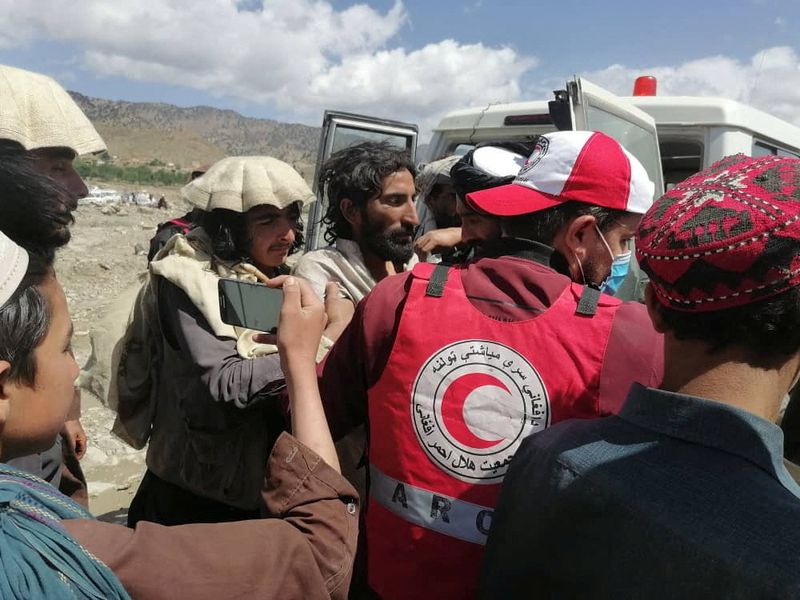Afghan authorities scramble to reach earthquake zone, toll at 1,000 dead
2022.06.23 12:05
2/2

Afghan Red Crescent medics and volunteers transport earthquake victims to hospitals in Spera district, Khost province, Afghanistan, June 22, 2022. Afghan Red Crescent Society/Handout via REUTERS
2/2
By Mohammad Yunus Yawar and Sayed Hassib
GAYAN, Afghanistan (Reuters) -Afghan authorities struggled on Thursday to reach a remote area hit by an earthquake that killed 1,000 people but poor communications and a lack of proper roads hampered their efforts, officials said.
The magnitude 6.1 earthquake struck early on Wednesday about 160 km, (100 miles) southeast of Kabul, in arid mountains dotted with small settlements near the border with Pakistan.
“We can’t reach the area, the networks are too weak, we trying to get updates,” Mohammad Ismail Muawiyah, a spokesman for the top Taliban military commander in hardest-hit Paktika province, told Reuters, referring to telephone networks.
The earthquake killed some 1,000 people and injured 1,500 injured, he said. More than 3,000 houses were destroyed.
The toll makes its Afghanistan’s deadliest earthquake in two decades, according to U.S. government data.
About 600 people had been rescued from various affected areas on Wednesday night, disaster management officials said.
The town of Gayan, close to the epicentre, sustained significant damage with most of its mud-walled buildings damaged or completely collapsed, a Reuters team said.
The town, with only the most basic roads, was bustling with Taliban soldiers and ambulances as a helicopter bringing in relief supplies landed nearby, whipping up huge swirls of dust. About 300 people sat on the ground waiting for supplies.
The rescue operation will be a major test for the hard-line Islamist Taliban authorities, who took over the country last August after two decades of war and have been cut off from much international assistance because of sanctions.
The Taliban-led ministry of defence is leading rescue efforts.
The United Nations said its World Food Programme (WFP) was sending food and logistics equipment to affected areas, with the aim of initially supporting 3,000 households.
“The Afghan people are already facing an unprecedented crisis following decades of conflict, severe drought and an economic downturn,” said Gordon Craig, WFP deputy country director in Afghanistan.
“The earthquake will only add to the already massive humanitarian needs they endure daily.”
Japan and South Korea both said they also plan to send aid.
Large parts of South Asia are seismically active because a tectonic plate known as the Indian plate is pushing north into the Eurasian plate.
In 2015, an earthquake struck the remote Afghan northeast, killing several hundred people in Afghanistan and nearby northern Pakistan.








